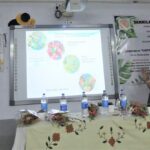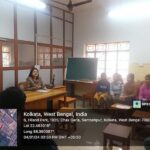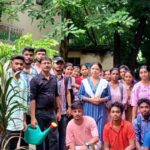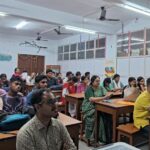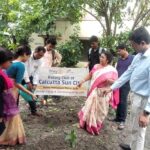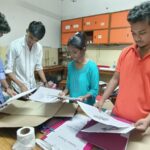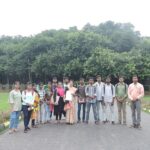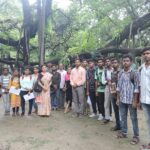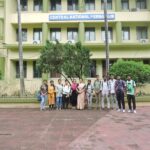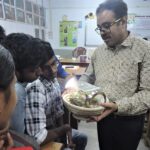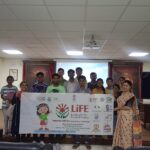- About the Department
- Faculty Profile
- Courses Offered
- PO and CO
- Teaching-learning
- Result and Student Progression
- Departmental Activities and Achievements
- Alumni
- Gallery
Achievement of the Department: The department has contributed towards establishing a collection of medicinal and economic plants in the college garden to promote conservation and education of local therapeutic flora. The learners themselves have contributed to developing the herbaria collection for the Department of Botany. Learning tools like Information and Communication Technologies, animated presentations, and macroscopic/microscopic specimens are used regularly to enrich the learning experience. They support learner-centered active instructional strategies, enable collaboration through shared learning spaces and resources, and promote critical thinking and problem-solving skills. The collection of reference books in the seminar library encourages independent and reflective learning among the learners. Every year, local excursions and a visit to Acharya Jagadish Chandra Bose Indian Botanic Garden connect the learners to the floral diversity and ecological interrelationships of the diverse life forms around them. Students are thus encouraged to conserve plant wealth for a sustainable world.
Programs Offered:
- Three-Year B.Sc. Program in Botany (General Course) under Choice-Based Credit System
- 3-Year Multidisciplinary Course in Biological Sciences based on National Education Policy, 2020.

Dr. Dipannita Parial
Designation: SACT
Email: dipsparial2018@gmail.com
Phone Number: 9477403150Get Detail »

Dr. Monolina Sarkar
Designation: SACT
Email: botanymonolina@gmail.com
Phone Number: 8777838112Get Detail »
- Three-Year B.Sc. Program in Botany (General Course) under Choice-Based Credit System
- 3-Year Multidisciplinary Course in Biological Sciences based on National Education Policy, 2020.
Program Learning Outcomes:
- Define the fundamental concepts underlying the physiological and genetic characteristics of plant species.
- Comprehend the use of taxonomic tools essential for plant identification and classification.
- Identify the interrelationship of evolution, ecological interactions, and biodiversity.
- Apply basic scientific concepts to explain plant-related phenomena.
- Organize learning concepts into coherent frameworks as the foundation of critical thinking.
Course Learning Outcomes
Phycology
- Identify the morphological and physiological traits characterizing algae.
- Compare the traits of the major algal groups.
- Review algal features that are related to the evolutionary history of plants.
- Classify the role of algae as environmental and economic resources.
Bryophytes
Identify distinguishing morphological, anatomical, physiological, reproductive, and adaptive characteristics of the major groups.
- Describe the distributions and classification systems.
- Identify the major groups and their evolutionary relationships.
- Use keys and identification manuals for identifying plants.
- Review the ecological and economic importance.
Pteridophytes, Gymnosperms
- Identify distinguishing morphological, anatomical, physiological, reproductive, and adaptive characteristics of the major groups.
- Describe the distributions and classification systems.
- To recognize the major groups and their evolutionary relationships.
- Use keys and identification manuals for plant identification.
- Review the ecological and economic importance.
Anatomy
- Identify different parts of plant anatomical structures.
- Identify, draw, and describe the anatomical structure of the root, stem, and leaf.
- Analyze the dissected sections of root, stem, and leaf under the microscope.
Morphology
- Identify and distinguish inflorescence, flower, fruit, and seed types with examples,
- Analyze the vegetative and floral parts of angiosperms as diagnostic features of selected families.
Taxonomy
- Explain the species concept.
- Identify taxonomic principles and their application in plant nomenclature.
- Identify diagnostic features, systematic position (Bentham & Hooker), and economically important plants (parts used and uses) of Monocotyledons and Dicotyledons.
Mycology
- Identify the morphological and physiological traits characterizing Fungi.
- Analyze how the fungi relate to other organisms.
- Compare the traits of the major classes of fungi.
- Discuss the importance of fungi in various ecological and economic roles.
Plant Pathology
- Define the scope and importance of Plant Pathology.
- Describe the principles and types of sterilization methods.
- Discuss the prevention and control measures of plant diseases.
Palaeobotany
- Define the basic concepts and scope of Paleobotany.
- Classify the types of fossils and fossilization events of organisms.
- Differentiate changes in plants throughout the geological time scale and describe their evolutionary relationships.
Cell Biology and Genetics
- Describe the structural organization and function of intracellular organelles chromosomes and genes
- Identify the structure and function of atoms, biomolecules, and chemical bonds
- Differentiate between Mendelian and extra-chromosomal inheritance
- Analyze the fundamental processes of cell signaling
- Explain the DNA replication, damage, and repair mechanisms
- Describe RNA synthesis and processing, Protein synthesis and processing, and the control of gene expression.
Microbiology
- Describe microbial diversity relating to the cell structure, function, growth, and metabolism.
- Explain the basic genetic systems of bacteria and viruses.
- Demonstrate practical skills in fundamental microbiological techniques
- Discuss the importance of fungi in various ecological and economic roles.
Plant Biotechnology
- Define and illustrate the fundamentals of Recombinant DNA Technology.
- Categorize the methods of gene transfer
- Evaluate the role of Biotechnology in Plant, Animal, and Human welfare
Plant Physiology and Metabolism
- Evaluate the abiotic and biotic factors that affect plant growth.
- Describe the processes of Photosynthesis, Respiration, Nitrogen metabolism, Sensory photobiology, and Stress physiology
- Define and interconnect the role of plant Growth hormones (Auxins, Gibberellins. Cytokinins, Ethylene) in plant physiology
- Outline the biosynthesis and function of terpenes, phenols, and nitrogenous compounds
Phytochemistry and Medicinal Botany
- Explore the uses of plants as medicine by traditional indigenous approaches.
- Classify the techniques for drug evaluation.
- Specify conservation practices of medicinal plants.
Economic Botany
- Explain the concepts of centers of origin and their importance with reference to Vavilov’s work.
- Identify the economically important species of cereals, pulses, spices, beverages, medicinal, oil-yielding, fruits, vegetables, fiber-yielding, timber-yielding, and sugar-yielding plants along with their origin, morphology, and parts used.
Presentations: Textual resources are integrated with animations, videos, and images to make the content more interesting, interactive, and accessible. Students are also encouraged to collaborate in preparing projects related to the curriculum. It enhances understanding and long-term retention of concepts.
Demonstrations: Experimental learning helps students to comprehend the concepts and empowers them to reflectively self-assess the application of theoretical knowledge in real-world situations.
Local Excursions: The learners are encouraged to identify native flora, acknowledge conservation measures, and ecological interrelationships through local excursions and visits to the Acharya Jagadish Chandra Bose Indian Botanic Garden and Central National Herbarium.
Seminars: Students are encouraged to attend seminars and interact with biology researchers. It enhances critical thinking in a dynamic learning environment and motivates them for lifelong learning.
Workshops: Workshops encourage students to discuss theoretical ideas with experts and practice skills in authentic scenarios. They also provide opportunities to enhance teamwork and communication.
Debates and Quiz: Debates and Quiz competitions are organised to encourage learners to think critically, develop reasoning skills, and acknowledge diverse perspectives.
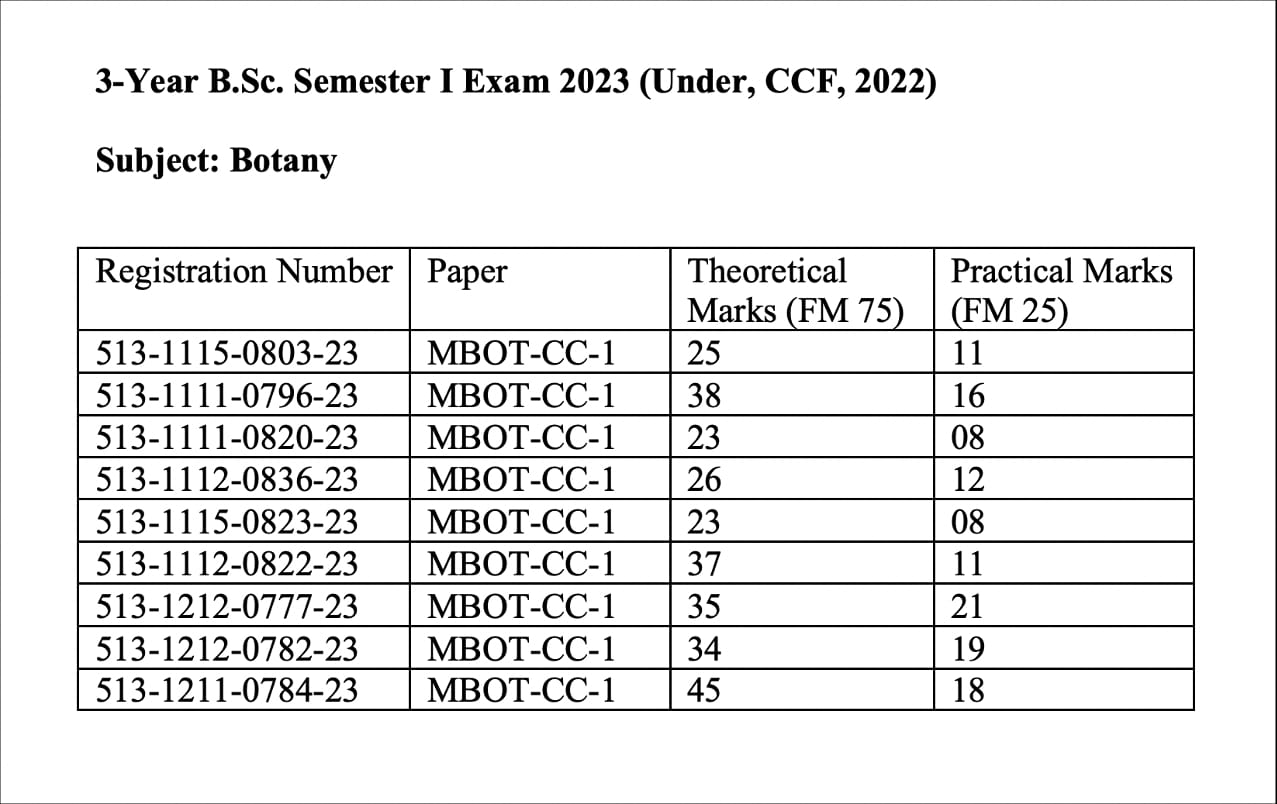

Mentor-Mentee System: Student mentees are each assigned one of the Departmental faculty mentors to share the difficulties they face in their academic journey in college. Mentors address their needs by arranging remedial classes, referring reference books from the departmental and central library, and encouraging collaborative discussions. Each mentee is encouraged to attend regular theoretical and practical sessions and actively self-assess their challenges.
Remedial classes: Difficulties in specific sections of the curriculum are identified through continuous summative evaluations. Remedial sessions are provided and the teaching-learning process is modified as required.
Virtual Classroom Supports: To enhance the Teaching–learning experiences, the department incorporates Information and Communication Technology. For online classes, references are provided through Learning Management Systems. Faculty members assign tasks that students can view, edit, or submit at their own pace while teachers can monitor the progress of each student. It allows the students to review the curriculum and corresponding assignments for detailed understanding. The method encourages the learners to keep track of the syllabus, and topics covered while addressing all levels of the learning objectives.
College Garden: The college garden is actively maintained in association with the Department of Botany. It supports educational purposes and fosters a conservational ideology within the community.
Parampara Community: Peer-mentoring system encourages alumni and present-student collaborations to discuss professional development.
| Name Of The Students | Year Of Passing | Present Status |
| 1. Ankita Sarkar | 2019 | Medical Laboratory Technologist at Calcutta National Medical College |
| 2. Bapan Biswas | 2019 | Entrepreneur, Website Development and Online Advertising Company |
| 3. Nabanita Ghosh | 2020 | Constable in Kolkata Police |
| 4. Suman Naskar | 2021 | Assistant Section Officer, Headquarter, Ministry of Defense, Delhi |
| 5. Arnab Jana | 2021 | Medical Technologist in the Department of Radiology in Desun Hospital, Kolkata |
| 6. Dipshikha Karmakar | 2023 | Teaching staff at Sarada Vidyamandir |

